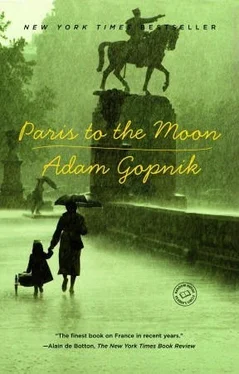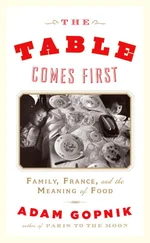“What did the French obstetrician say when you told her that?”
“She made that ‘oh’ face—you know, that lips-together, ‘How naive can one be?’ face—said that it was far too dangerous to do the CVS, and then she prescribed a lot of drugs for pain. I’ve got antispasmodics, antinausea drugs, painkillers, and some other ones too. Then she told me I could drink red wine and absolutely not to eat any raw vegetables. She keeps asking me if I’ve had any salad. She says ‘salad’ the way the doctors in New York say ‘uninsured.’”
French doctors like to prescribe drugs as much as New York doctors like to publish books. I suppose that it fulfills a similar need for self-expression with a pen, without having to go to the trouble of having your photograph taken with a professional yet humane grin. You cannot go into a French doctor’s office for a cinder in your eye and emerge without a six-part prescription, made up of pills of different sizes to be taken at irregular intervals.
I wanted to meet Martha’s doctor, who would be delivering the baby while I “coached”—I am of the Phil Jackson school as a coach; you might not actually see me doing much, but I contribute a lot to the winning atmosphere—and so I accompanied her to the next appointment. We sat in the waiting room and read Elle some more. By now Martha was nervous. An American friend who lives in Normandy had gone into labor a few days before, only to find that all the anesthesiologists had gone out on strike that morning. She had delivered the baby, her second, without any epidural.
“I want to go to a place where the anesthesiologists are scabs,” Martha said. “Or nuns or something. I don’t want to go to a place where the man with the epidural is on a picket line.”
While we were in the waiting room, a man in black jeans and a black silk shirt with the sleeves rolled up, and with a Pat Riley hairstyle, peeked in and mischievously summoned one of the women in the waiting room. “Who’s that?” I asked. “The other obstetrician,” Martha said. “Does he always dress like that?” I demanded. “Oh, yes. He’s very nice. He examined me last time.” Martha’s doctor was wearing black stretch slacks, a black tank top, and a handsome gold necklace. She was very exacting about appearances. “You have gained too much weight,” she said to Martha, who had in fact gained less than with her first pregnancy. “Start swimming, stop eating.” (Martha says that a friend who went for an appointment two months after the birth of her second baby was told by the same doctor, “You look terrible. And do something about your hair.”) We did another sonogram. “Look at her, she’s pretty,” the doctor said as we looked at the sonogram. “There’s her fille,” she said, pointing to the sex. Then she again counseled Martha to swim more and gave her a prescription for sleeping pills. We talked a bit about the approach of those hard, exhausting first weeks with a newborn. “Get a night nurse,” she advised. “Go out with your husband. Be happy again.”
In New York, in other words, pregnancy is a medical condition that, after proper care by people in white coats and a brief hospital stay, can have a “positive outcome.” In Paris it is something that has happened because of sex, which, with help and counsel, can end with your being set free to go out and have more sex. In New York pregnancy is a ward in the house of medicine; in Paris it is a chapter in a sentimental education, a strange consequence of the pleasures of the body.
In America, we have managed to sexualize everything—cars, refrigerators, computers, Congress—except the natural consequences of sex. Though it is de rigueur for every pregnant super-model to have her picture taken when she is full-bellied, it is always the same picture. She covers her breasts, she is swaddled below in some way, and she looks off into the middle distance, not dreamily, as she might when wearing lingerie, but slightly anxiously, as though she could not remember if she had left her husband’s electric guitar turned on. The subject, the hidden subject, is not the apotheosis of sexuality but its transcendence into maternal instinct: babe into mother by way of baby.
In France, though, a pregnant woman is alive, since she has demonstrated both her availability and her fecundity: We Have a Winner. Though Lamaze method childbirth began here, it remains cultish and sectarian. Most women nurse for three months, no more. (It shrinks your breasts and gives you an uncomfortable accessory.) And when the anesthesiologists are not striking, they are, as our baby-sitter says, fully busy. (Two French friends of ours talk about natural childbirth: “What is the English for accouchement sans douleur’?” one asks. “A lie,” the other answers.)
The prohibition on uncooked vegetables, by the way, turns out to have a solid scientific basis. Toxoplasmosis—a mild parasitic infection that is devastating to unborn children—though it’s rare in America (it’s that thing you can get from cat litter), is common in France. Red wine is recommended, in turn, because it is high in iron and acts as an effective antispasmodic.
By law a French woman who is going to have a baby is guaranteed—not merely allowed but pretty much compelled—to stay four or five nights in a clinic or a hospital. In New York, when our son, Luke, was born—in the Klingenstein Pavilion of Mount Sinai Hospital—we had two days to have the baby, bond, and get out. French law is specific and protective about the rights of pregnant women. If you are a salaried employee, you get six weeks of prenatal leave and ten weeks of paid leave after the baby is born. For a third child, you get eight weeks off and eighteen more, and if you have three at once, you get, in all, forty-six weeks of paid leave. (The leave is paid, through a complicated formula, by your employer and the state.) The law is as finely tuned as a viola d’amore. There is even a beautiful added remarque, right there on the government document: “ Les artistes du spectacle, les mannequins des maisons de couture,” and others who do work that is plainly incompatible with the state of pregnancy (i.e., a bigger belly) are assured of paid leave after the twenty-first week. In France, Cindy and Paulina and the rest would not just be having their pictures taken. They would already be on the dole.
The system, Martha’s doctor observed once during a visit, is “royal for the users, good for the doctors, and expensive for the society.” There are many rational arguments to be made about whether or not the outcomes justify the expenditures, and in any case, the level of care that the French have insisted on may be unsustainable. But the people who are being treated “royally” are ordinary people—everybody. For many, perhaps most, French people, life at the end of the century in the American imperium may look a bit like a typical transatlantic flight, with the airless, roomless, comfortless coach packed as tightly as possible, so that the maximum dollars can be squeezed out of every seat, with a few rich people up front. I am American enough to understand that this is, so to speak, one of the prices of mass travel—that there is no such thing as a free lunch, or clinic—and yet have become French enough to feel, stubbornly, that legroom and a little air should not be luxuries for the rich and that in a prosperous society all pregnant women should have three sonograms and four nights in a hospital, if they want to. It doesn’t seem particularly royal to have four nights in a clinic when you have a baby or aristocratically spoiled to think that a woman should keep her job and have some paid leave afterward, even sixteen weeks, if she happens to be a mannequin in an haute couture house. All human desires short of simple survival are luxurious, and a mothers desire to have a slightly queenly experience of childbirth—a lying in rather than a pushing out and a going home—seems as well worth paying for as a tobacco subsidy or another tank.
Читать дальше












